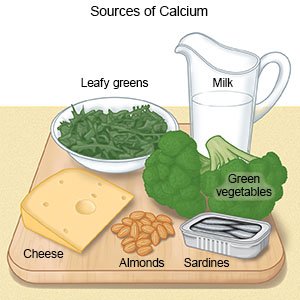Calcium and Osteoporosis
Medically reviewed by Drugs.com. Last updated on Aug 4, 2025.
Why is calcium important for osteoporosis?
Calcium is important for osteoporosis because calcium helps build bone mass. Osteoporosis is a long-term medical condition that causes your body to break down more bone than it makes. Your bones become weak, brittle, and more likely to fracture.
How much calcium do I need?
- Women:
- 19 to 50 years: 1,000 mg
- Over 50: 1,200 mg
- Pregnant or breastfeeding, 19 to 50 years: 1,000 mg
- Men:
- 19 to 70: 1,000 mg
- Over 70: 1,200 mg
Related medications
Treatment options
The following list of medications are related to or used in the treatment of this condition.
Which foods are high in calcium?
The following list shows the number of calcium milligrams (mg) per serving. Your healthcare provider or dietitian can help you create a balanced meal plan for your calcium needs.
- Dairy:
- 1 cup of low-fat plain yogurt (415 mg) or low-fat fruit yogurt (245 to 384 mg)
- 1½ ounces of shredded cheddar cheese (306 mg) or part skim mozzarella cheese (275 mg)
- 1 cup of skim, 2%, or whole milk (300 mg)
- 1 cup of cottage cheese made with 2% milk fat (138 mg)
- ½ cup of frozen yogurt (103 mg)
- Other foods:
- 1 cup of calcium-fortified orange juice (300 mg)
- ½ cup of cooked collard greens (220 mg)
- 4 canned sardines, with bones (242 mg)
- ½ cup of tofu (with added calcium) (204 mg)

How can I get extra calcium?
- Add powdered milk to puddings, cocoa, custard, or hot cereal.
- Sift powdered milk into flour when you make cakes, cookies, or breads.
- Use low-fat or fat-free milk instead of water in pancake mix, mashed potatoes, pudding, or hot breakfast cereal.
- Add low-fat or fat-free cheese to salad, soup, or pasta.
- Add tofu (with added calcium) to vegetable stir-fry.
- Take calcium supplements if you cannot get enough calcium from the foods you eat. Your body can absorb the most calcium from supplements when you take 500 mg or less at one time. Do not take more than 2,500 mg of calcium supplements each day.
Care Agreement
You have the right to help plan your care. Discuss treatment options with your healthcare provider to decide what care you want to receive. You always have the right to refuse treatment. The above information is an educational aid only. It is not intended as medical advice for individual conditions or treatments. Talk to your doctor, nurse or pharmacist before following any medical regimen to see if it is safe and effective for you.© Copyright Merative 2025 Information is for End User's use only and may not be sold, redistributed or otherwise used for commercial purposes.
Learn more about Calcium and Osteoporosis
Treatment options
Care guides
Symptoms and treatments
Further information
Always consult your healthcare provider to ensure the information displayed on this page applies to your personal circumstances.
